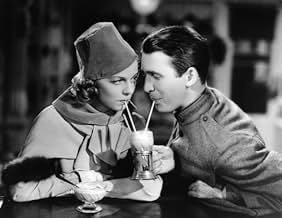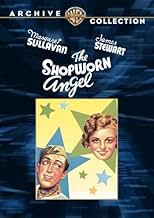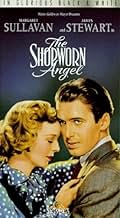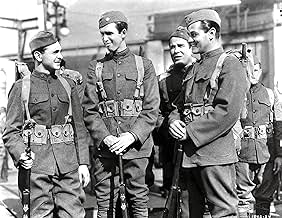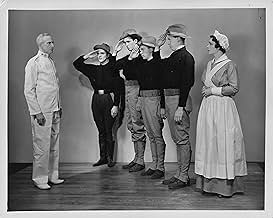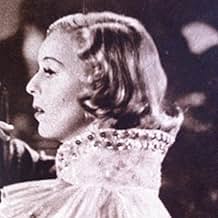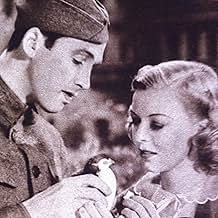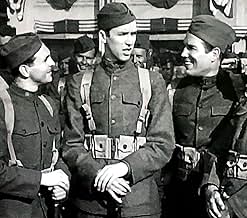NOTE IMDb
6,9/10
1,8 k
MA NOTE
Ajouter une intrigue dans votre langueShortly after the United States enters World War I in 1917, a Broadway actress agrees to let a naive soldier court her in order to impress his friends, but a real romance soon begins.Shortly after the United States enters World War I in 1917, a Broadway actress agrees to let a naive soldier court her in order to impress his friends, but a real romance soon begins.Shortly after the United States enters World War I in 1917, a Broadway actress agrees to let a naive soldier court her in order to impress his friends, but a real romance soon begins.
- Réalisation
- Scénario
- Casting principal
- Récompenses
- 3 victoires au total
Charley Grapewin
- Wilson - Caretaker
- (scènes coupées)
Wade Boteler
- Irish Policeman
- (non crédité)
Don Brodie
- Candy Store Attendant
- (non crédité)
Jimmy Butler
- Jack - Elevator Boy
- (non crédité)
Eddy Chandler
- Corporal
- (non crédité)
George Chandler
- Tommy - Soldier
- (non crédité)
Roger Converse
- Hotel Clerk
- (non crédité)
James Flavin
- Guard Yelling 'Halt!'
- (non crédité)
Avis à la une
The Waldo Salt screenplay takes a small story and develops it into an affecting portrait of three surprisingly convincing and complex human characters, all of whom transcend the typical dramatic constraints of late '30s Hollywood. All three principals turn in excellent, low-key performances in perfect keeping with the film's narrative strengths. I find it particularly interesting to compare this with the other bookend to Salt's screenwriting career, Coming Home, also a character-driven story that revolves around the complex, three-way relationship between a woman and the two men who love her in a time of war.
While the Stewart-Sullivan pairing doesn't quite live up to the chemistry they have in The Shop Around the Corner, this earlier film shows they had it even then. It's their acting talent that keeps this film from being a major letdown. Walter Pidgeon is also good in his role, for what it is. It's the plot that stinks. The two leads have SO much chemistry that it makes Sullavan's character Daisy Heath's relationship with Pidgeon's Sam Bailey not so realistic. She was supposed to have realized she was still more in love with Sam than ever but it just doesn't quite come across. What does leap off the screen is the chemistry between Bill Pettigrew (played by Stewart) and Daisy Heath..so yes, it's a letdown that Heath is not supposed to be in love with Bill when the plot builds up to it.
I know I am going to sound really picky here, but the hairstyles and clothes are 1938--not WWI like the movie is supposed to be (other than uniforms). You'd think that MGM would pay attention to this detail, as it was THE top studio at the time. Yet, oddly, nearly everyone (especially the women) wear clothes that just would never have been worn in 1917--and hair to boot. And, when the folks were riding the roller coaster, they almost all had hats on--and none of them flew off! As a retired history teacher, I notice these things and felt the movie didn't try very hard to get these simple details right. So is the rest of the film worth seeing? Well, considering that it's got Jimmy Stewart and Margaret Sullavan, what do you think?!
The film is a sweet romance. Stewart is a backward country boy who, unlike all his other friends in the army, does not have a girlfriend and is very awkward around women. So, to stop them from making fun of him, on an impulse, he pretends that an actress (Sullavan) is his girlfriend. Oddly, she feels sorry for him and agrees to the ruse. However, over time, this jaded lady comes to life when she's with Stewart and eventually they fall in love for real. Where it goes next, I won't say--but I was very surprised where the film went. Some may hate the surprise but I appreciated how the writer avoided the clichéd or simple ending.
Well worth seeing despite some poor attention to details. Exceptionally acted (it doesn't get much better) and a dynamite script. See this one.
The film is a sweet romance. Stewart is a backward country boy who, unlike all his other friends in the army, does not have a girlfriend and is very awkward around women. So, to stop them from making fun of him, on an impulse, he pretends that an actress (Sullavan) is his girlfriend. Oddly, she feels sorry for him and agrees to the ruse. However, over time, this jaded lady comes to life when she's with Stewart and eventually they fall in love for real. Where it goes next, I won't say--but I was very surprised where the film went. Some may hate the surprise but I appreciated how the writer avoided the clichéd or simple ending.
Well worth seeing despite some poor attention to details. Exceptionally acted (it doesn't get much better) and a dynamite script. See this one.
This is a surprisingly touching movie. It presents the "marry the soldier who is shipping out to near certain death" story, which would play out in real life when the US entered WWII, but in this case, prior to that entry, with a soldier shipping out to France in 1917.
Stewart plays it simple, which works here. He is a sympathetic catalyst who somehow brings the true lovers together in a roundabout manner. Walter Pidgeon is really good here - maybe the best I've seen him - in that he avoids his more typical coolness for genuine vulnerability. The ending in telegraphed, but still sad in that way you love movies to be sad.
Stewart plays it simple, which works here. He is a sympathetic catalyst who somehow brings the true lovers together in a roundabout manner. Walter Pidgeon is really good here - maybe the best I've seen him - in that he avoids his more typical coolness for genuine vulnerability. The ending in telegraphed, but still sad in that way you love movies to be sad.
When the United States enters World War I, patriotic Texan Jimmy Stewart (as William "Bill" Pettigrew) is among those to sign up for service. In New York for basic training, Mr. Stewart is bowled over by showgirl Margaret Sullavan (as Daisy Heath), but she is promised to distinguished Walter Pidgeon (as Sam Bailey). With Mr. Pidgeon's okay, Ms. Sullavan shows young Stewart around the city, including the roller-coaster at Coney Island. They're supposed to be "just friends" but Stewart is falling in love
This was a direct re-make of the 1928 silent/sound success starring Nancy Carroll and Gary Cooper, and there were dozens of films with this romantic wartime love triangle. Most of the time, the male characters had different outcomes. The story is strained in places and diluted from the original, but the picture is nicely produced and performed well. The Stewart/Sullavan chemistry is easy to appreciate. A new Broadway musical sensation known as Mary Martin provides Sullavan with a beautiful singing voice.
****** The Shopworn Angel (7/15/38) H.C. Potter ~ Margaret Sullavan, James Stewart, Walter Pidgeon, Hattie McDaniel
This was a direct re-make of the 1928 silent/sound success starring Nancy Carroll and Gary Cooper, and there were dozens of films with this romantic wartime love triangle. Most of the time, the male characters had different outcomes. The story is strained in places and diluted from the original, but the picture is nicely produced and performed well. The Stewart/Sullavan chemistry is easy to appreciate. A new Broadway musical sensation known as Mary Martin provides Sullavan with a beautiful singing voice.
****** The Shopworn Angel (7/15/38) H.C. Potter ~ Margaret Sullavan, James Stewart, Walter Pidgeon, Hattie McDaniel
Le saviez-vous
- AnecdotesBroadway musical-comedy star Mary Martin provides the singing voice for Margaret Sullavan. This same year she also dubbed the singing voice for Gypsy Rose Lee in Les deux bagarreurs (1938). Modern sources indicate that Universal's La coqueluche de Paris (1938), which was filmed at approximately the same time as The Shopworn Angel was Martin's first film "bit" role. According to records of the M-G-M Music Collection at the USC Cinema-Television Library, Martin's recording of "Pack Up Your Troubles in Your Old Kit Bag and Smile, Smile, Smile was made on 1 June 1938.
- GaffesBill mails his postcards after leaving the soda fountain, seemingly without putting any stamps on them, but on one shot while he's sitting at the lunch counter you can see stamps on the cards. However, in the next close-up, just before he leaves, the cards are unstamped. The likely reason is that all the closeup shots where he's writing on the blank cards were filmed together with the same camera setup, and the long shots were shot later after stamps were added. (Perhaps they filmed a scene of Bill buying and affixing stamps but decided not to use it.)
- Citations
Pvt. William 'Texas' Pettigrew: Dying's a lot like being in love. You can't imagine it until its right on top of you.
- ConnexionsFeatured in AFI Life Achievement Award: A Tribute to James Stewart (1980)
- Bandes originalesYou're In The Army Now
(1917) (uncredited)
Music by Isham Jones
Lyrics by Tell Taylor and Ole Olsen
Played as background music for marching soldiers
Meilleurs choix
Connectez-vous pour évaluer et suivre la liste de favoris afin de recevoir des recommandations personnalisées
- How long is The Shopworn Angel?Alimenté par Alexa
Détails
Box-office
- Budget
- 531 000 $US (estimé)
- Durée
- 1h 25min(85 min)
- Couleur
- Rapport de forme
- 1.37 : 1
Contribuer à cette page
Suggérer une modification ou ajouter du contenu manquant


